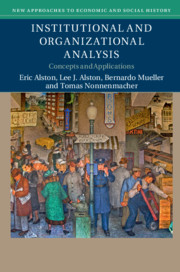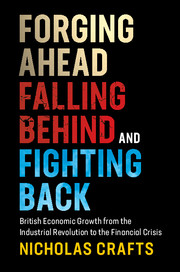Refine search
Actions for selected content:
26946 results in Economic history
Copyright page
-
- Book:
- Forging Ahead, Falling Behind and Fighting Back
- Published online:
- 04 August 2018
- Print publication:
- 09 August 2018, pp iv-iv
-
- Chapter
- Export citation
1 - Introduction
-
- Book:
- Forging Ahead, Falling Behind and Fighting Back
- Published online:
- 04 August 2018
- Print publication:
- 09 August 2018, pp 1-10
-
- Chapter
- Export citation
Acknowledgements
-
- Book:
- Forging Ahead, Falling Behind and Fighting Back
- Published online:
- 04 August 2018
- Print publication:
- 09 August 2018, pp ix-x
-
- Chapter
- Export citation
References
-
- Book:
- Forging Ahead, Falling Behind and Fighting Back
- Published online:
- 04 August 2018
- Print publication:
- 09 August 2018, pp 130-150
-
- Chapter
- Export citation
RHE volume 36 issue 2 Cover and Back matter
-
- Journal:
- Revista de Historia Economica - Journal of Iberian and Latin American Economic History / Volume 36 / Issue 2 / September 2018
- Published online by Cambridge University Press:
- 08 August 2018, pp. b1-b2
- Print publication:
- September 2018
-
- Article
-
- You have access
- Export citation
RHE volume 36 issue 2 Cover and Front matter
-
- Journal:
- Revista de Historia Economica - Journal of Iberian and Latin American Economic History / Volume 36 / Issue 2 / September 2018
- Published online by Cambridge University Press:
- 08 August 2018, pp. f1-f3
- Print publication:
- September 2018
-
- Article
-
- You have access
- Export citation

Institutional and Organizational Analysis
- Concepts and Applications
-
- Published online:
- 04 August 2018
- Print publication:
- 23 August 2018

Forging Ahead, Falling Behind and Fighting Back
- British Economic Growth from the Industrial Revolution to the Financial Crisis
-
- Published online:
- 04 August 2018
- Print publication:
- 09 August 2018

Austria Supreme, if it so Wishes (1684): 'A Strategy that Made Europe Rich'
-
- Published by:
- Anthem Press
- Published online:
- 25 July 2018
- Print publication:
- 25 June 2018
US inflation and inflation uncertainty over 200 years
-
- Journal:
- Financial History Review / Volume 25 / Issue 2 / August 2018
- Published online by Cambridge University Press:
- 02 July 2018, pp. 141-159
-
- Article
- Export citation
Leslie Berlin, Troublemakers: Silicon Valley's Coming of Age
-
- Journal:
- Business History Review / Volume 92 / Issue 2 / Summer 2018
- Published online by Cambridge University Press:
- 25 July 2018, pp. 343-353
- Print publication:
- Summer 2018
-
- Article
- Export citation
Analysing Corruption. By Dan Hough. London: Agenda Publishing, 2017. x + 205 pp. Notes, tables, bibliography, index. Cloth, $85.00; paper $30.00. ISBN: cloth, 978-1-911116-54-7; paper, 978-1-911116-55-4.
-
- Journal:
- Business History Review / Volume 92 / Issue 2 / Summer 2018
- Published online by Cambridge University Press:
- 25 July 2018, pp. 395-397
- Print publication:
- Summer 2018
-
- Article
- Export citation
Confronting Capital and Empire: Rethinking Kyoto School Philosophy. Edited by Viren Murthy, Fabian Schäfer, and Max Ward. Leiden: Koninklijke Brill, 2017. xii + 395 pp. Notes, references, index. Cloth, $152.00. ISBN: 978-90-04-34389-4.
-
- Journal:
- Business History Review / Volume 92 / Issue 2 / Summer 2018
- Published online by Cambridge University Press:
- 25 July 2018, pp. 371-373
- Print publication:
- Summer 2018
-
- Article
- Export citation
From Head Shops to Whole Foods: The Rise and Fall of Activist Entrepreneurs. By Joshua Clark Davis. New York: Columbia University Press, 2017. 336 pp. Figures, notes, index. Cloth, $35.95. ISBN: 978-0-2311-7158-8.
-
- Journal:
- Business History Review / Volume 92 / Issue 2 / Summer 2018
- Published online by Cambridge University Press:
- 25 July 2018, pp. 400-403
- Print publication:
- Summer 2018
-
- Article
- Export citation
Reassessing the Italian “Economic Miracle”: Law, Firms’ Governance, and Management, 1950–1973
-
- Journal:
- Business History Review / Volume 92 / Issue 2 / Summer 2018
- Published online by Cambridge University Press:
- 25 July 2018, pp. 281-306
- Print publication:
- Summer 2018
-
- Article
- Export citation
Rainy Lake House: Twilight of Empire on the Northern Frontier. By Theodore Catton. Baltimore: Johns Hopkins University Press, 2017. xvi + 396 pp. Maps, notes, index. Cloth, $32.95. ISBN: 978-1-4214-2293-0.
-
- Journal:
- Business History Review / Volume 92 / Issue 2 / Summer 2018
- Published online by Cambridge University Press:
- 25 July 2018, pp. 414-416
- Print publication:
- Summer 2018
-
- Article
- Export citation
Global and Local: Retail Transformation and the Department Store in Britain and Japan, 1900–1940
-
- Journal:
- Business History Review / Volume 92 / Issue 2 / Summer 2018
- Published online by Cambridge University Press:
- 25 July 2018, pp. 251-280
- Print publication:
- Summer 2018
-
- Article
- Export citation
Fear City: New York's Fiscal Crisis and the Rise of Austerity Politics. By Kim Phillips-Fein. New York: Metropolitan Books, 2017. 401 pp. Notes, index. Cloth, $32.00. ISBN 978-0-805-095-258.
-
- Journal:
- Business History Review / Volume 92 / Issue 2 / Summer 2018
- Published online by Cambridge University Press:
- 25 July 2018, pp. 418-421
- Print publication:
- Summer 2018
-
- Article
- Export citation
BHR volume 92 issue 2 Cover and Front matter
-
- Journal:
- Business History Review / Volume 92 / Issue 2 / Summer 2018
- Published online by Cambridge University Press:
- 25 July 2018, pp. f1-f7
- Print publication:
- Summer 2018
-
- Article
-
- You have access
- Export citation
One Nation under Gold: How One Precious Metal Has Dominated the American Imagination for Four Centuries. By James Ledbetter. New York: Liveright Publishing, 2017. xvii + 380 pp. Photographs, notes, index. Cloth, $28.95. ISBN: 978-0-87140-683-5.
-
- Journal:
- Business History Review / Volume 92 / Issue 2 / Summer 2018
- Published online by Cambridge University Press:
- 25 July 2018, pp. 381-382
- Print publication:
- Summer 2018
-
- Article
- Export citation
